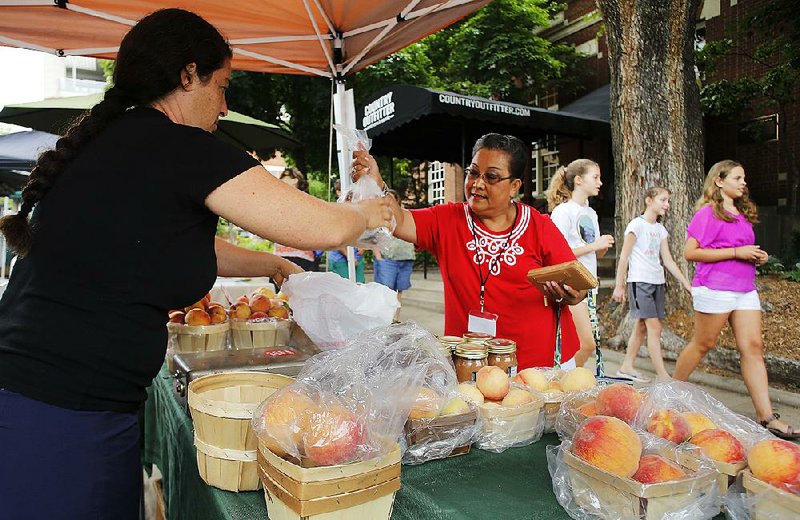An increasing number of farmers markets has decreased the distance between farm and fork in Arkansas.
According to the U.S. Department of Agriculture's National Farmers Market Directory, the number of markets in Arkansas has more than tripled over the past decade, growing from 28 markets in 2004 to 97 in 2014.
And five markets were added this year -- making Arkansas' growth the sixth-highest in the country.
"We're all in this together. If we can get the public good food at a good price, then we're doing a good thing," said Glenn Woelk, Fayetteville Farmers Market vice president and Mason Creek Farm co-owner. "Every city and every town and every community that has the chance to get good food, that's a positive."
Woelk said that he never expected the Fayetteville market to get busier than in 2012, when warm weather allowed producers to harvest fruit as early as May, but attendance has only grown since then.
Zachary Taylor, director of marketing for the Arkansas Agriculture Department, said relaxed regulations, a central kitchen and a desire for local food have expanded well-established farmers markets and fueled the creation of new ones.
Farmers markets heavily lobbied for the 2011 cottage food law, which allows individuals to sell homemade products such as bread and jam without industrial kitchens or Arkansas Department of Health oversight.
The law allowed leftover products to became a new source of revenue at farmers markets, Taylor said.
"As soon as that law came into effect, production really took off," he said. "It allowed farmers to take fruits that they had and turn it into something like jellies they could sell all year long."
For products that couldn't be sold under the cottage food law, the Arkansas Food Innovation Center has provided an inexpensive, U.S. Food and Drug Administration-approved space for producers to manufacture food, Taylor said.
The Fayetteville facility, which opened in late 2011, has a full industrial kitchen, including a 10-burner range, convection oven, industrial refrigerator and freezer, and food processing and juicing equipment. It also has the software to make FDA-required nutrition labels.
Mike Davis, the center's manager, said the producers can sell products made at the center commercially. Some products have made it onto Wal-Mart shelves, he said.
"Most of the people that come out here and get started, they've either never sold their product before or they're selling it at a local farmer's market," Davis said. "As far as I know, we're the only facility of this type in the state."
Producers drive from as far as Little Rock and Jonesboro to take advantage of the equipment, he said. The center houses 30 to 40 different companies and about another 40 intermittent users.
Woelk said Arkansas' cottage food law and the Food Innovation Center have allowed producers to remove the middle man and spend more time with customers at the Fayetteville market.
"It takes us to the public. You're one-on-one with the consumer," he said. "When you see someone selling at the Fayetteville Farmers Market, you know that person made the product."
Business on 08/05/2014
